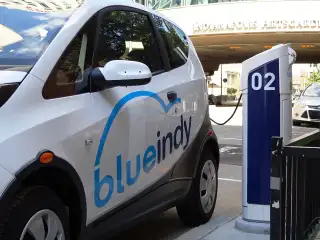Groundbreaking Electric Car Sharing Program Launches in an Unlikely City

On Wednesday, the nation's most ambitious electric car sharing program launches in a city that'll probably surprise you. It's not San Francisco, where startups, innovation, sustainability, and forward thinking rule. It's not in Austin, Boston, Denver, or either of the Portlands.
Nope, the city that'll play host to what's planned as the country's biggest electric car sharing service is … Indianapolis.
The program, BlueIndy, is being run by a French company called the Bolloré Group, which says it is investing $41 million in the Indianapolis operation. A ribbon-cutting ceremony will be held on Wednesday with members of the company alongside Greg Ballard, Indianapolis's Republican mayor who has long championed the program.
The company has said BlueIndy will have 25 charging stations and 50 vehicles around the city at launch, and the plan is for 200 stations and 500 electric cars in the near future. The cars themselves are small white hatchbacks made by Bolloré, featuring the BlueIndy logo on the sides.
Prices vary depending on the type of membership a driver opts for, and they're charged on a sliding scale. Subscribers who sign up for a year pay $9.99 per month, then $4 for the first 20 minutes of a rental and 20¢ per minute after that. At the other end of the spectrum, a one-day membership is free, though the daily rates are much higher—$8 for the first 20 minutes and 40¢ per minute thereafter. Weekly and monthly memberships are also possible. There are no fees for parking, insurance, or gas (these are electric cars, remember), though drivers could incur charges for getting into accidents ($500 deductible) and things like failing to plug the car into the charger ($55).
Will this model sell in Indianapolis? We'll have to wait and see if locals think the service makes sense in terms of convenience, comfort, and economics. Perhaps the bigger question revolves around how the program landed in Indianapolis in the first place. Without knowing any better, it would be reasonable to assume that a cutting-edge program like this would first appear in a city that already stands out for green initiatives and electric car adoption. Indianapolis, meanwhile, stands out for having one of the worst public transit systems in the country.
In fact, the sad state of Indianapolis public transportation is part of what drove Bolloré to the city. “We think it’s the perfect city to do this,” BlueIndy General Manager Scott Prince explained to the Indianapolis Business Journal. “If we had the world’s greatest mass transit system today, this arguably would not be the first city we’d be launching in in America.”
After all, if the city already had top-notch public transit options, there would be less need for a large car sharing program. At the same time, plenty of skepticism about the program's viability in Middle America remains. “It is an odd choice, there’s no doubt about it,” Michael Thwaite, president of Plug In America and a partner of Tesla Motors Club, told the Indianapolis Business Journal. “One would have thought that they would have started in a very electric-car-friendly city.”
In addition to the state of local public transportation, supporters of BlueIndy point to the city's large student population and its ability to attract tourists—especially for big sporting events—as reasons why the program has a great chance of succeeding.
Critics, on the other hand, have complained about the costs. While Bolloré is taking the biggest financial risk in this endeavor, the Indianapolis city council agreed to use $6 million in city funds, without the approval of taxpayers, for the project. Other critics have questions about BlueIndy's safety, and about the possibility that charging stations could hurt local businesses.